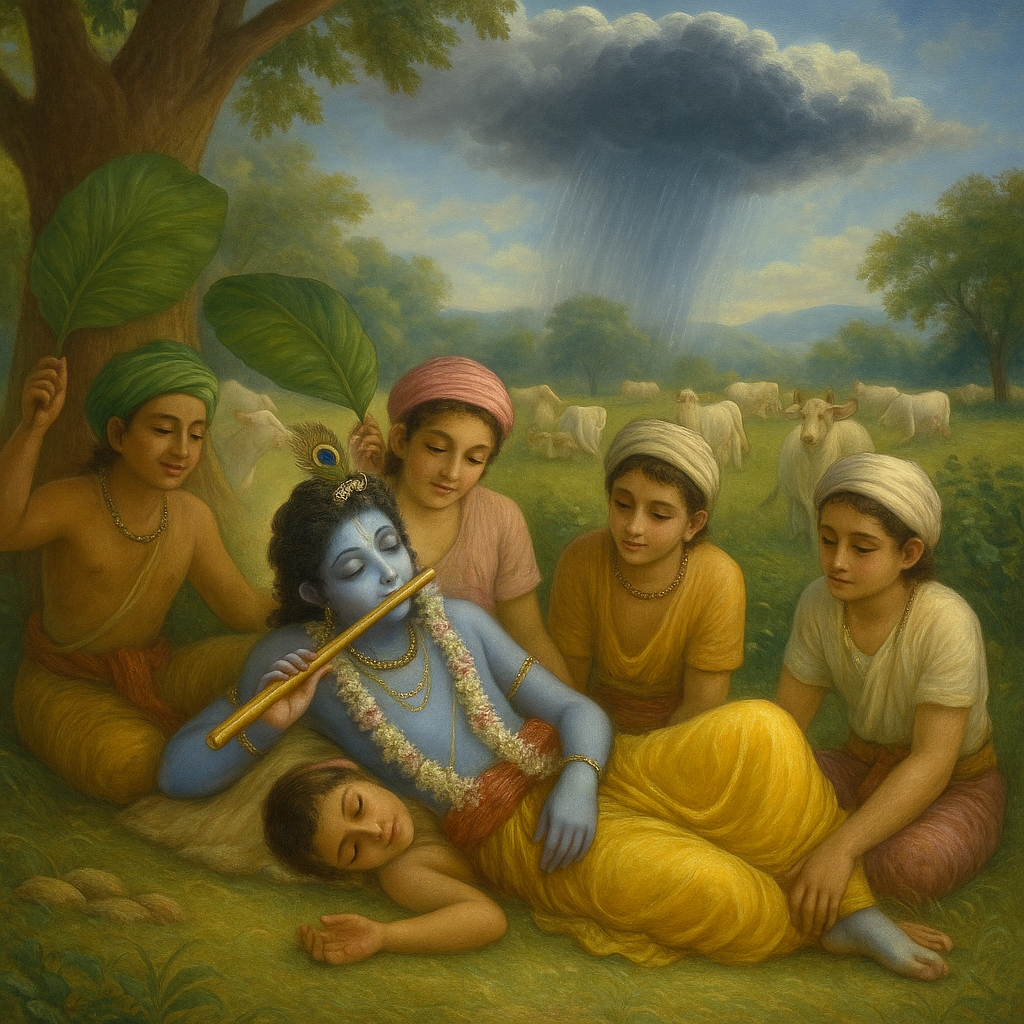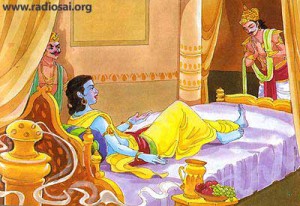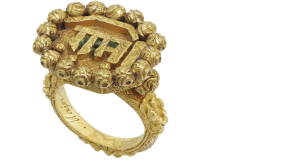One summer day, Kṛṣṇa, along with the cows and cowherd boys, was traversing the forest of Vṛndāvana in search of fresh grasses when they came upon an orchard now known as Badali. It was midday and unbearably hot. All the boys and cows immediately rushed under the shade of the trees, hoping to escape the scorching sun. To the boys, it felt as though the oppressive heat would never end.
Kṛṣṇa lay down, placing His head on the lap of one of His cowherd friends. Two other boys fanned Him with leafy branches, while another pair massaged His hands and feet. Observing everyone’s discomfort, one boy addressed Him:
“Gopāla, You have shown us Your mystic powers before. Can’t You do something about this heat? It’s so hot, we can hardly breathe. A refreshing rain or a cooling breeze would be the perfect remedy. Just look at Your friends and cows and see how much they are suffering.”
Always concerned for the wellbeing of His devotees, Kṛṣṇa immediately took His flute and played a special melody—one that summoned the clouds. No sooner had He done so than a cloud appeared above Him, gradually expanding to form a vast canopy across the sky. It created a giant umbrella that blocked out the sun’s harsh rays. Kṛṣṇa was pleased.
Soon, a cooling breeze began to blow from the north, and tiny droplets of water showered down upon the place where Kṛṣṇa and His friends were resting. In mere moments, the entire atmosphere transformed into the soothing gentleness of spring. The cowherd boys’ exhaustion and discomfort vanished. The cows rose to their feet and began grazing again, delighted by the refreshing mist.
The boys joyfully praised the clouds as Kṛṣṇa’s true friends.
Although this pastime may appear simple—Kṛṣṇa playing His flute and clouds appearing—one ācārya remarks:
“Kṛṣṇa’s astonishing deeds increase His loved ones’ affection, which in turn inspires greater admiration for even His small acts of wonder—what to speak of the true miracles He performs.”
Because a cloud appeared at Kṛṣṇa’s request and brought a pleasant, cooling rain, this place came to be known as Badali—from badala, the Sanskrit word for “cloud.” The cowherd boys always remembered this pastime with affection.
Though simple, this Badali pastime is deeply rich in rasa, like all of Kṛṣṇa’s activities—whether with His parents, the cowherd boys, or the gopīs. These lilas are relished by paramahaṁsas, the topmost swan-like devotees of the Lord. But anyone, if sincere, can be elevated to that platform and taste the same nectar.
This is only possible by the mercy of the Yuga-avatāra, Śrī Caitanya Mahāprabhu, who is more merciful even than Kṛṣṇa Himself. It is said that to receive the mercy of Lord Nityānanda, we must follow His example and preach to the Jagāis and Mādhāis to the best of our ability.
Thus, we once again see a direct connection between the pastimes of Lord Kṛṣṇa 5,000 years ago and the pastimes of Lord Caitanya Mahāprabhu—because He is none other than that same Kṛṣṇa, come to taste and distribute love of God.
Lesson to Be Learned
Even in the simplest moments, Kṛṣṇa reveals His profound love and concern for His devotees. He responded immediately to the plea of a cowherd boy and transformed the environment—not to prove His power, but to offer comfort.
From this we learn that when we turn to Kṛṣṇa sincerely—even with a small plea from the heart—He listens. He is not distant. He is always nearby, waiting to respond to loving devotion.
Also, this lila teaches us the beauty of friendship with the Lord: Kṛṣṇa finds joy not in awe and reverence but in intimate exchanges—serving and being served, joking, and playing in the mood of loving friendship.
In our lives, too, we can cultivate such a relationship with the Lord—by remembering Him in our difficulties, inviting Him into our joys, and seeing His hand even in life’s smallest comforts.
STORY IS ORIGINALY NARATED BY INDRADYUMNA SWAMI


